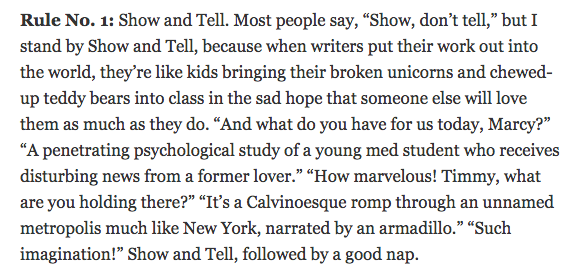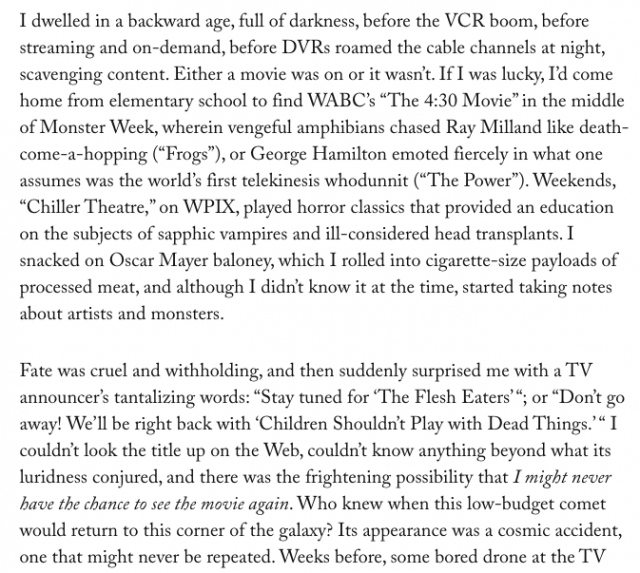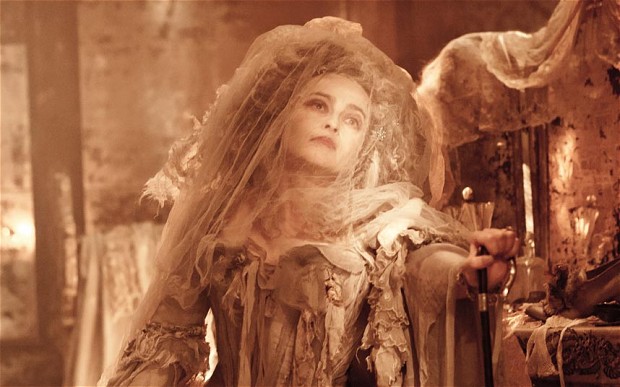#33: Some Colson Whitehead Appreciation
Hi hi, friends,
I was skipping around Google the other day and was reminded of a piece by Colson Whitehead called “How To Write.” You may have read it when it came out in 2012 and laughed and, if you did, I can assure you that if you reread it now you will laugh again. It starts with the observation that the “art of writing can be reduced to a few simple rules” and kicks off with this one:


It is like putting your broken unicorn out there, isn’t it? Anyway, Whitehead’s new novel The Underground Railroad is coming out Sept. 13, and I’ve been counting down to it. Currently, we’re at nine weeks, five days! (I have another countdown going for Ruth Franklin’s Shirley Jackson biography, which is out Sept. 27th.) It’s his eighth book, a number which, if you’ve been following him since The Intuitionist was published in 1999, may give you a vertiginous sense of… something.
When The Intuitionist came out, I was working at an ad agency as a copywriter, and I still remember reading a Laura Miller interview with Whitehead at Salon one morning, walking over to Malaprop’s Bookstore at lunch, and being relieved when they had a copy in stock. It’s a cliché but it feels like something that happened a long, long time ago—and also like it was just last year. From that interview:
When did you decide that you wanted to be a novelist?
When I was a kid. I read Stephen King and I thought he was really cool. I wanted to write novels with monsters in them. It was kind of funny, this year, to see the rediscovery of Stephen King.
Miller then asks him about his time working as a TV critic for The Village Voice:
Did you learn things from being a TV critic that helped?
I think I got a lot of stuff out of my system. I learned some good habits from having to produce every other week and trying to make it fresh. Village Voice style back then encouraged the first-person — that sort of me-me-me stuff — and I worked through various preoccupations with pop culture. Some of the pieces were very satirical and over-the-top, and I would go overboard sometimes and think, “Oh, that didn’t work very well,” so I’d come back with something better. You can’t just make ’70s references all the time. After the 10th “Good Times” joke, it’s not fresh.
I remember a little of Whitehead’s TV (and music) criticism—and am hoping that with the new novel out, someone will do an archive crawl to dig more of it up. In the meantime, there’s this 2012 New Yorker piece on his childhood love of B-movies to revisit, which is, in its way, about time’s passage, too. It also connects up to that urge of “wanting to write about monsters” (and his zombie novel Zone One):

“Cigarette-size payloads of processed meat”—the madeleine of ’70s Home Alone-ness.
Other News!

If you haven’t read it yet, I wrote an essay for The Toast’s final week, Miss Havisham: A History. It’s a deep, juicy dive into the real-life origins of that famous literary jiltee as well as a meditation on longing and obsession. Please read and love it!
Until next week,
hoping your skies are filled with low-budget comets,
CAAF
p.s. If you haven’t subscribed to this newsletter and would like to, go here.
—
Carrie Frye
Black Cardigan Edit